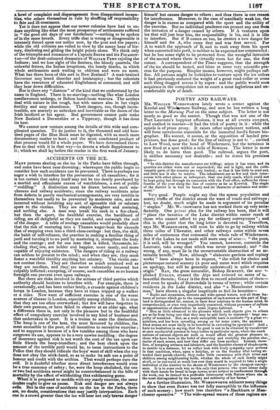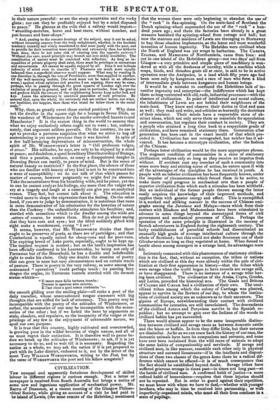POETRY AND RAILWAYS.
Ma. WILLIAM WORDSWORTH lately wrote a sonnet against the Kendal and Windisrmere Railway, and now he has written a long letter to the Morning Post on the same subject. The letter is not nearly so good as the sonnet. Though that was not one of the Poet Laureate's happiest effusions, it was at all events compact, and exalted in manner—it had the trick of poetry in it : while the epistle is of prose prosy. It raises other unpleasant notions, and will form unwelcome materials for the immortal bard's future bio- grapher. His sonnet, it seems, or the opposition of landed pro- prietors, has done good ; for the line of railway is not tc ' _ carried to Low Wood, near the head of Windermere, but the terminus is now fixed at a spot within a mile of Bowness. The letter is more likely to do harm than good. The railroad, argues the poet, is neither necessary nor desirable ; and he states his premises thus- " In this district the manufactures are trifling; mines it has none, and its quarries are either worn out or superseded; the soil is light, and the culti- vateable parts of the country are very limited; so that it has little to send out, and little has it also to receive. The inhabitants are so few and their inter- course with other places so infrequent, that one daily coach, which could not be kept going but through its connexion with the Post-office, suffices for three- fourths of the year along the line of country as far as Keswick. The staple of the district is in fact its beauty and its character of seclusion and retire- ment."
Very good. People might say that the sparse population and scanty traffic of the district attest the want of roads and railways ; but, no doubt, much might be made in argument of its peculiar
" staples." Mr. Wosnswoarn has not worked them up very satis- factorily. One potent plea for the railway has been, that it will
" place the beauties of the Lake district within easier reach of those who cannot afford to pay for ordinary conveyances" ; and this is the point that the long letter is devoted to. Travellers, says Mr. Woanswomt, will soon be able to go by railway within three miles of Ullswater, and other railways come within seven miles of eminences that command the whole vale of Windermere.
But if the Lakes be not made still more easy of acces4, " the poor,
it is said, will be wronged." You cannot, however, contends the Laureate, take away that which was never possessed ; and " the
wrong, if any, must lie in the unwarrantable obstruction of an at- tainable benefit." Now, although " elaborate gardens and topiary works " have always been in request, " the relish for choice and
picturesque natural scenery (a poor and mean word which requires an apology, but will be generally understood) is quite of recent origin." RAY, the great naturalist, Bishop BURNETT, the ace, .1.. plished EVELYN, crossed the Alps and evinced no sense of tte beautiful therein ; GRAY is the first to record admiration of them— and even he speaks of Borrowdale in terms of terror ; while certain residents in the Lake district, and also " a Manchester trades- man," have shown a singular inaptitude to feel its beauties- " Rocks and mountains, torrents and wide-spread waters, and all those fea- tures of nature which go to the composition of such scenes as this part of Eng- land is distinguished for, cannot, in their finer relations to the human mind, be comprehended, or even very imperfectly conceived, without processes of culture
or opportunities of observation in some ;degree habitual. * • •
" Men as little advanced in the pleasure which such objects give to others are so far from being rare that they may be said fairly to represent r large ma- jority of mankind. But, as a more susceptible taste is undoubtrr'ly a great at%- quisition, and has been spreading among ua for some years, the question what means are most likely to be beneficial in extending its operation ? And have no hesitation in saying, that the good is not to be obtained by transferrino at once uneducated persons in large bodies to particular spots, where the comb nations of natural objects are such as would afford the greatest pleasure to those who have been in the habit of observing and studying the peculiar cha-,, racier of such scenes, and how they differ one from another. Instead, there- fore, of tempting artisans and labourers, and the humbler classes of shopkeepers, to ramble to a distance, let us rather look with lively sympathy upon persons in that condition, when, upon a holyday, or on the Sunday after having at- tended their parish-church, they make little excursions with their wives and children among neighbouring fields, whither the whole of each family might stroll, or be conveyed at much less cost than would be required to take a single individual of the number to the shores of Windermere by the cheapest convey- ance. It is in some such way as this only that persons who must labour daily with their hands for bread in large towns, or are subject to confinement throu0. the week, can be trained to a profitable intercourse with Nature where she is the most distinguished by the majesty and sublimity of her forms."
As a further illustration, Mr. Woanswortra adduces many things to show that even BURNS was not fully susceptible to the influence of such scenery ; how much less therefore " a Blackburn or Mao.. cheater operative." " The wide-spread waters of these regions are
in their nature peaceful: so are the steep mountains and the rocky glens ; nor can they be profitably enjoyed but by a mind disposed to peace." He glances at the evils that a railway would import- " wrestling-matches, horse and boat races, without number, and pot-houses and beer-shops."
" And, passing to the remoter bearings of the subject, may it not be asked, without incurring censure from the truly enlightened, whether, in the laudable tendency recently and widely manifested to deal more justly with the poor, and to provide for their recreation more carefully and extensively than has hitherto been done, there be not same risk of running into the opposite extreme ? Without due care, sound principle may branch out into sickly sensibility. The constitution of society must be examined with reflection. As long as in- equalities of private property shall exist, there must be privileges in recreations and amusements. All cannot be equally enjoyed by all. Does it not indicate infirmity of mind even to describe it ? Pleasures are much more equally balanced than a superficial observer would suppose. What may be wanting in one direction is, through the care of Providence, more than supplied in another. Of the well meaning zealots, (the word must not be taken in an offensive sense,) against whose opinions and practice I am arguing, there may be some, perhaps, who in passing through the great squares of London sigh over the exclusion of people in general, and of the poor in particular, from the groves and gardens which the owners of the neighbouring houses keep under lock and key. Leave the aristocracy in unenvied possession of such privacies. Be assured that, upon the whole; the extremely rich are neither better, nor wiser, nor healthier, nor happier, than those who stand far below them in the social scale."
Why, then, so greatly covet those envied positions ? Why does not the dweller in the square sigh for a lounge in Seven Dials, or the wanderer of Windermere for the smoke-corroded haunts round Manchester ? It is the easiest thing in the world to assume that what we enjoy exclusively others ought not to want ; but, unfortu- nately, that argument seldom prevails. On the contrary, its use is apt to provoke a perverse suspicion that what we strive to beg off surrendering is yet more precious than it was fancied. In spite of a few half-betraying deprecations of misconstruction, the whole spirit of Mr. WORDSWORTH'S letter is " Odi profanum vulgus, et arceo." His solitudes, he says, are only to be enjoyed by a mind at peace; and doubtless, a quasi hereditary Distributorship of Stamps, and then a pension, conduce, as many a disappointed dangler in Downing Street can testify, to peace of mind. But is the sense of natural beauty so restricted ? In the first place, the silence of those, who are familiar with beauty of any kind is not to be construed into a want of susceptibility : we do not talk of that which passes for matter of course, however poignantly we might feel its absence. Take the mountaineer from his breathing wilds, and he pines; yet ten to one he cannot analyze his feelings, any more than the vulgar who cry at a tragedy and laugh at a comedy can give you an analytical reason. They feel, but cannot talk about it. The education is "eded more to shape the expression than the feeling. On the other hand, if you are to judge by demonstration, it is notorious that none is more demonstrative of his admiration for the beauties of nature than the Cockney : the unfamiliarity stimulates his faculties; and, startled with sensations which to the dweller among the wilds are .utters of course, he names them. Men do not go about saying chat they have ears and eyes ; but the blind suddenly gifted with sight make a wonderment, crying " I see !" It seems, however, that Mr. WORDSWORTH thinks that there ought to be preserves of poets, as there are of partridges ; and that Cumberland is equally suited for sheep-runs and for poet-runs. The expiring breed of Lake poets, especially, ought to he kept up. The implied request is modest ; but as the bard's inspiration has been officially confirmed in his Laureateship, he being not only of Parnassus but of the Household, he has a double and indefeasible right to make his claim. Only one doubts the stamina of poetry that can grow in none but easy circumstances and on certain tracts of pasture. There is poetry in the very railway, as some among the contemned " operatives" could perhaps teach : its panting fiery dragon the engine, its Tartarean tunnels startled with the demon steam-whistle- "11 rauco anon della tartarea tromba :
Treman le spaziose atre cavcrne, E l'aer cieco a quel comer rimbomba "-
the smooth gliding over the smiling plain—all make a poet of the daily traveller, whose unaccustomed tongue stammers with big thoughts that are stifled for lack of utterancy. This poetry may be incompatible with the poetry of the solitudes of Windermere, or rather, the accessories of one may be incompatible with the acces- sories of the other ; but if we forbid the bans by arguments so stale, obsolete, and repulsive, as the incapacity of the vulgar or the privilege of any few in the enjoyment of untameable nature, we spoil our own purpose. It is true that this country, highly cultivated and overcrowded, is growing poor in the wilder beauties of virgin nature, and all of us must regret their extinction. It is therefore well to pause be- fore we break up the solitudes of Windermere ; to ask, if it is yet necessary to do so, and to wait till it is necessary. Regarding the nation as a whole, we may ask the nation if it is yet prepared to part with its Lake district, endeared to it, not by the letter of the most Tory WILLIAM WORDSWORTH, writing to the Post, but by the verse of WORDSWORTH the poet and his fellow songsters ?



























 Previous page
Previous page